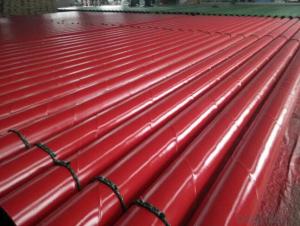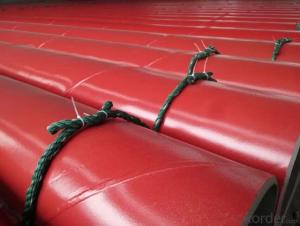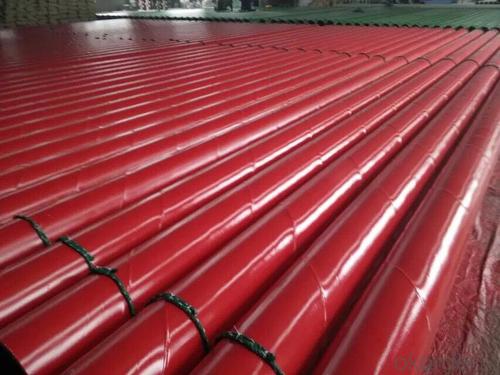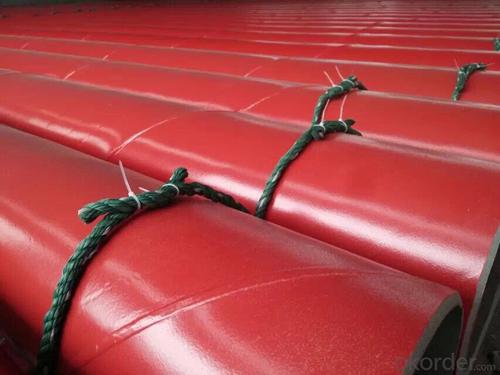SSAW LSAW 3PE 2PE steel pipe external coating
- Loading Port:
- China Main Port
- Payment Terms:
- TT OR LC
- Min Order Qty:
- -
- Supply Capability:
- -
OKorder Service Pledge
OKorder Financial Service
You Might Also Like
Specifications
water pipeline inner-layer tape
1 Butyl rubber as adhesive
2. SGS test report and DVGW certificate
3. corrosion protection
water pipeline inner-layer tape
State-of-the-Art Pipeline Protection for All Climates & Environments
System description:
WATER PIPELINE Inner -layer tape also be called pipe wrap anti-corrosion tape, polyethylene wrap tape.
water pipeline Inner-layer tapeT100 is engineered to assure a high bond to the primed pipe surface with excellent conformability characteristics, aggressive adhesive for corrosion protection and repair of main line coatings.
Inner-layer tapeT100 series is cold applied tape coating system for corrosion protection of Oil, Gas, Petrochemical, and Waste Waterburied pipeline, pipe can be buried, also can be underground ,overhead ,onshore and offshore .
Structure of water pipeline inner wrap tape
The specification of the tape consists of two layers, adhesive layer and film backing
Adhesive: butyl rubber
Film backing: Special blend of stabilized polyethylene
Features & Benefits
Provides a permanent bond to the primed steel pipes surface and provides protection against chemical electrolytic corrosion for underground pipelines.
long term corrosion protection
Worldwide reference lists. Established in-ground history
High chemical resistance under service temperature.
Outstanding electric property and permanent adhesion.
Cold applied, No release liner. Makes installation fast and easy.
Complies with EN-DIN 30672 and AWWAC-214 international standards and also ASTM standards.
Be used for water pipeline corrosion protection
System Properties
Type | T138 | T 150 | T165 | T180 | T 250 | T265 | T280 | |
Thickness | 15mil 0.38mm | 20mil 0.508mm | 25mil 0.635mm | 30mil 0.762mm | 20mil 0.508mm | 25mil 0.635mm | 30mil 0.762mm | |
Backing | 9mil 0.229mm | 9mil 0.241mm | 10mil 0.25mm | 10mil 0.25mm | 15mil 0.38mm | 20mil 0.508mm | 25mil 0635mm | |
Adhesive | 6mil 0.152mm | 11mil 0.279mm | 15mil 0.381mm | 20mil 0.508mm | 5mil 0.127mm | 5mil 0.127mm | 5mil 0.127mm | |
When used for ductile iron pipes inner layer 980-20 or 980-25 and outer layer 955-20 or 955-25 are recommended. | ||||||||
Elongation | ³300% | ³400% | ||||||
Tensile Strength | 55 N/cm | 70 N/cm | ||||||
Color | Black | White | ||||||
Peel Adhesion to Primed Pipe | 33 N/cm | |||||||
Dielectric Strength | 30 KV | |||||||
Dielectric Breakdown | 26 KV/mm | |||||||
Cathodic Disbandment | 0.24 in radius 6.4 mm | |||||||
Water Vapor Transmission Rate | < 0.1% | |||||||
Volume Resistivity | 2.5 x 1015 ohm.cm | |||||||
Impact resistance | 5.5Nm | |||||||
Penetration Resistance | <15% | |||||||
Performance | AWWA C-209,ASTM D 1000,EN 12068 | |||||||
Order information
Length | 100ft(30 M),200ft(60 M),400ft(120 M),800ft(240 M) |
Width | 2’’(50mm),4’’(100mm),6’’(150mm),17’(450mm),32’’(800mm) |
- Q: What is the difference between steel pipe and fiberglass pipe?
- Steel pipe and fiberglass pipe are two different types of materials used for piping systems. One major difference between steel pipe and fiberglass pipe is the material they are made of. Steel pipe is made from steel, which is an alloy of iron and carbon. It is known for its strength and durability, making it a popular choice for various applications, including plumbing, construction, and industrial projects. On the other hand, fiberglass pipe is made from glass fibers embedded in a resin matrix. This combination results in a lightweight and corrosion-resistant material, making it suitable for applications where chemical resistance is required, such as in the chemical industry or wastewater treatment plants. Another difference between steel pipe and fiberglass pipe is their flexibility. Steel pipe is known for its rigidity and stiffness, which makes it less flexible than fiberglass pipe. This rigidity can be an advantage in certain applications where stability and strength are crucial, such as underground infrastructure or high-pressure systems. Fiberglass pipe, on the other hand, offers more flexibility, allowing it to bend and conform to different shapes and contours. This flexibility makes it easier to install in tight spaces or areas with complex geometries. Corrosion resistance is another important difference between steel pipe and fiberglass pipe. Steel pipe is susceptible to corrosion, especially in environments with high moisture or chemical exposure. To protect against corrosion, steel pipes are often coated with a layer of protective material or lined with corrosion-resistant coatings. In contrast, fiberglass pipe is inherently corrosion-resistant due to the nature of the materials used in its construction. This makes fiberglass pipe a preferred choice for applications where corrosion is a concern, such as in saltwater environments or chemical processing plants. Cost is another factor that differentiates steel pipe and fiberglass pipe. Steel pipe is generally more affordable than fiberglass pipe, especially for smaller diameter pipes. However, as the diameter and pressure rating increase, the cost of steel pipe can become significantly higher than fiberglass pipe. Additionally, fiberglass pipe requires less maintenance and has a longer lifespan, which can offset the initial cost difference over time. In summary, the main differences between steel pipe and fiberglass pipe lie in the materials they are made of, their flexibility, corrosion resistance, and cost. Steel pipe offers strength and rigidity but is prone to corrosion, while fiberglass pipe is lightweight, flexible, corrosion-resistant, and often more expensive. The choice between these two types of pipes depends on the specific requirements of the project, including factors such as the application, environment, budget, and lifespan expectations.
- Q: How are steel pipes used in the construction of shipbuilding?
- Steel pipes are widely used in shipbuilding as they provide structural support and are essential for various systems and components such as ventilation, fuel, and water supply. They are used to create the framework of the ship, including the hull, bulkheads, and decks. Additionally, steel pipes are crucial for piping systems that transport fluids and gases throughout the ship, ensuring its proper functioning and safety.
- Q: Can steel pipes be used for underground gas distribution?
- Yes, steel pipes can be used for underground gas distribution. Steel pipes are commonly used for gas distribution as they are strong, durable, and can withstand high pressure. Additionally, steel pipes have excellent resistance to corrosion, which is crucial for underground installations. However, it is important to ensure proper coating and insulation to prevent any potential damage or leakage.
- Q: What is the difference between carbon steel and alloy steel pipes?
- The main difference between carbon steel and alloy steel pipes lies in their composition. Carbon steel pipes are primarily made from iron and carbon, while alloy steel pipes are made from iron, carbon, and other elements such as manganese, nickel, chromium, or molybdenum. Alloy steel pipes have enhanced mechanical properties and better resistance to corrosion, heat, and pressure compared to carbon steel pipes. Additionally, alloy steel pipes are typically used in more demanding applications where strength and durability are critical.
- Q: What is the difference between steel pipe and PVC pipe?
- Both steel pipe and PVC pipe are commonly utilized materials for plumbing and other construction purposes; however, they possess several distinct dissimilarities. To begin with, the materials themselves differ. Steel pipe is manufactured from a blend of iron and carbon, known as steel. This material is renowned for its robustness and durability, rendering it appropriate for high-pressure applications and subterranean installations. Conversely, PVC (polyvinyl chloride) pipe is crafted from a type of plastic called PVC. PVC pipe is characterized by its lightweight nature, flexibility, and ease of handling, making it a favored choice for residential plumbing and irrigation systems. Next, the installation process varies. Steel pipe necessitates skilled labor and specialized tools for cutting, threading, and welding. It frequently involves a complex installation procedure, particularly for larger pipe sizes. Conversely, PVC pipe can be effortlessly cut with a saw or specialized pipe cutter and joined together utilizing solvent cement or threaded fittings. This renders PVC pipe more suitable for DIY projects and simpler installations. Moreover, steel pipe incurs greater costs compared to PVC pipe. Steel is a pricier material, and the manufacturing process for steel pipe is more intricate, entailing multiple steps and additional materials. PVC pipe, as a plastic-based material, is generally less expensive and more cost-effective, particularly for smaller diameter applications. In terms of performance, steel pipe possesses greater tensile strength, can endure higher levels of pressure, and exhibits greater resistance to temperature fluctuations, rendering it ideal for heavy-duty and industrial applications. Conversely, PVC pipe possesses lower tensile strength but is resistant to corrosion, chemicals, and scale buildup. PVC pipe is commonly employed in residential plumbing, irrigation systems, and other non-industrial applications. To summarize, the primary disparities between steel pipe and PVC pipe revolve around the materials used, installation processes, costs, and performance characteristics. While steel pipe is sturdier and more suitable for heavy-duty applications, PVC pipe is lighter, easier to install, and more cost-effective for residential and non-industrial purposes.
- Q: What are the different types of steel pipe reducers?
- Various industrial applications commonly use different types of steel pipe reducers. These reducers facilitate the connection between pipes of varying sizes, ensuring a smooth transition in fluid or gas flow. The following are some of the most frequently encountered types: 1. Concentric Reducers: These reducers possess a symmetrical design with a centerline that aligns with both the larger and smaller pipes' centerlines. They facilitate a gradual reduction in pipe size, ensuring a seamless material flow. 2. Eccentric Reducers: In contrast to concentric reducers, eccentric reducers have an offset centerline. This design is beneficial in preventing the accumulation of air or gases in the piping system. The eccentric reducer directs any gas or air towards a vent or drain point. 3. Welded Reducers: These reducers are created through the welding of two pipes of different sizes. They are frequently used in situations that require a permanent connection. 4. Seamless Reducers: Seamless reducers are manufactured without any welded joints. They are crafted from a single piece of steel, enhancing their strength and durability. Seamless reducers are often preferred in applications where leak-proof connections are crucial, such as high-pressure or high-temperature environments. 5. Threaded Reducers: These reducers have male and female threads on both ends, allowing for easy installation and removal. They are commonly used in low-pressure applications and are a cost-effective option for systems that require frequent disassembly. 6. Flanged Reducers: Flanged reducers possess flanges on both ends, which are bolted together to create a secure seal. They are frequently used in piping systems that require convenient access for maintenance or inspection. Each type of steel pipe reducer offers its own unique advantages and is selected based on the specific requirements of the application. Factors such as the transported fluid or gas type, pressure and temperature conditions, and the need for easy installation or maintenance should be considered when choosing the appropriate reducer for a particular system.
- Q: Are steel pipes suitable for desalination plants?
- Desalination plants can benefit greatly from the use of steel pipes. These pipes possess a variety of advantages that make them an ideal option for such facilities. Firstly, their resistance to corrosion is of utmost importance in desalination plants, where saltwater can be highly corrosive. The fact that steel pipes can withstand such corrosive conditions ensures the durability and longevity of the infrastructure, ultimately reducing maintenance and replacement expenses. Secondly, steel pipes exhibit remarkable strength, enabling them to withstand high-pressure situations commonly encountered in desalination plants. The ability of steel pipes to handle intense water flow without deformation or leakage guarantees the efficient and dependable operation of the desalination process. Moreover, steel pipes boast excellent heat resistance properties, rendering them suitable for desalination plants that engage in heat-intensive procedures like distillation or reverse osmosis. These pipes can endure high temperatures without suffering any structural damage, ensuring the secure and efficient transfer of heated water or steam. Furthermore, steel pipes are readily available and come in a wide range of sizes and specifications, allowing for flexibility in the design and construction of desalination plants. This availability and versatility make steel pipes a cost-effective choice for desalination projects. Overall, due to their resistance to corrosion, high strength, heat resistance, availability, and cost-effectiveness, steel pipes are highly suitable for desalination plants and are extensively used in the industry.
- Q: Can steel pipes be used for piling?
- Yes, steel pipes can be used for piling. Steel pipes are commonly used in piling applications due to their strength, durability, and versatility. They are able to withstand the load and pressure of the soil and provide a stable foundation for structures. Steel pipes used for piling are typically driven into the ground using specialized equipment, ensuring they are securely positioned. Additionally, steel pipes can be easily cut and welded to the required length, making them suitable for various piling projects.
- Q: How are steel pipes specified in engineering drawings?
- Steel pipes are specified in engineering drawings by providing information such as the diameter, length, wall thickness, material grade, and any other relevant specifications or standards that need to be followed.
- Q: How are steel pipes used in the construction of underground parking garages?
- Steel pipes are commonly used in the construction of underground parking garages for various purposes. They serve as structural supports, providing stability and strength to the overall structure. Steel pipes are also used for drainage systems, allowing for efficient disposal of water and preventing flooding. Additionally, they are utilized for the installation of utilities such as water, gas, and electrical lines, ensuring easy access and maintenance. Overall, steel pipes play a crucial role in the construction of underground parking garages by offering durability, functionality, and reliability.
Send your message to us
SSAW LSAW 3PE 2PE steel pipe external coating
- Loading Port:
- China Main Port
- Payment Terms:
- TT OR LC
- Min Order Qty:
- -
- Supply Capability:
- -
OKorder Service Pledge
OKorder Financial Service
Similar products
Hot products
Hot Searches
Related keywords




















